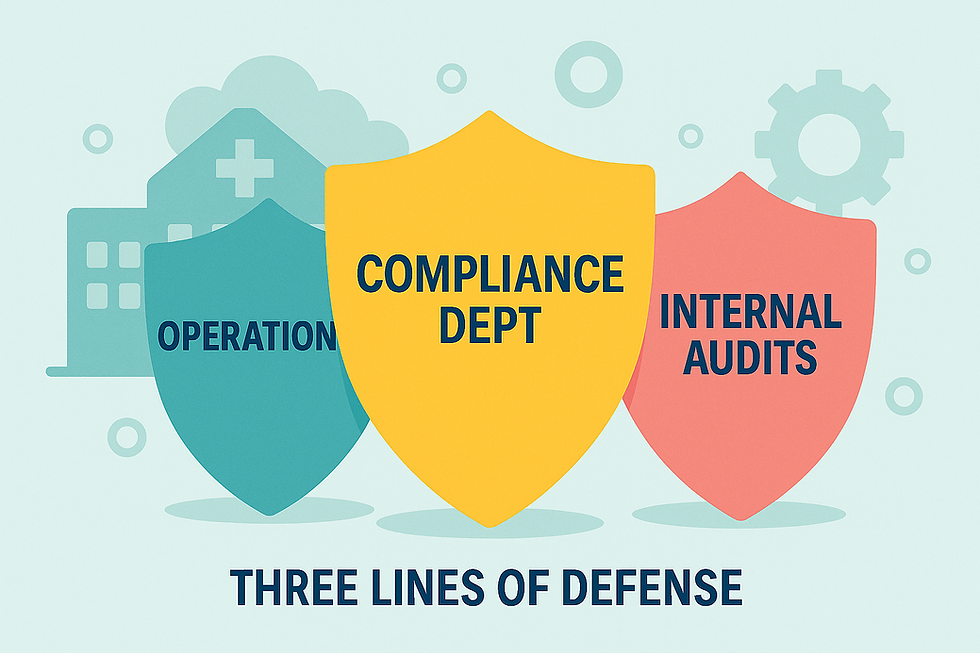The Proposed “One Big Beautiful Bill” Act: What It *Could* Mean for Compliance—and How to Prepare
- Jessica Zeff

- Jun 22
- 2 min read
As Congress considers sweeping legislation with implications across the healthcare landscape, the proposed One Big Beautiful Bill Act (OBBBA) is drawing attention—and concern—from compliance professionals. Touted as a transformative omnibus proposal, OBBBA combines a wide range of healthcare policy initiatives, from funding reforms and coverage changes to workforce limitations and new reporting requirements.
While headlines focus on political and financial implications, those of us in compliance need to cut through the noise and focus on what this could mean operationally. Below, I break down the potential compliance concerns raised by the Act, how they might impact your organization, and what you can do to prepare.
Potential Compliance Impacts to Monitor
1. Medicaid Redetermination and Coverage Loss
The bill proposes tighter requirements around Medicaid eligibility, accelerating redetermination timelines. If passed as written, this could lead to significant coverage loss, particularly for vulnerable populations.
Compliance Risk: Gaps in care coordination, disruption in reimbursement, and potential discriminatory impact if disenrollments affect specific populations disproportionately.
Action Item: Ensure your eligibility verification processes are current, audit disenrollment notifications for timeliness and accuracy, and develop mitigation strategies for patient continuity of care.
2. Restrictions on Gender-Affirming Care
OBBBA includes provisions that would limit federal funding for gender-affirming care and increase reporting requirements for providers who deliver such services.
Compliance Risk: Potential violations of nondiscrimination laws (e.g., Section 1557), reputational harm, and increased scrutiny of clinical decision-making.
Action Item: Review clinical and billing policies related to gender-affirming care, assess alignment with civil rights obligations, and train staff on navigating care delivery in evolving regulatory environments.
3. Medical Education and Workforce Provisions
The proposal includes caps on federal loans for medical school and changes to graduate medical education funding.
Compliance Risk: Long-term staffing shortages and potential violations of provider coverage requirements under Medicare or Medicaid contracts.
Action Item: Analyze staffing models and succession planning; assess contract obligations around minimum staffing or availability standards.
4. Loan Forgiveness and Provider Incentives
The bill proposes limits to federal loan forgiveness programs and restructures provider incentive programs.
Compliance Risk: Reduced retention in shortage areas and misalignment with new federal rules.
Action Item: Update HR and provider engagement strategies and reassess incentive structures.
5. Expanded Audit and Oversight Mechanisms
OBBBA proposes expanded CMS and OIG authority to audit provider claims, grants, and quality measures.
Compliance Risk: Increased extrapolated audits, penalties, and reputational risk.
Action Item: Review billing practices, document clinical justifications, and strengthen internal audit capabilities.
How Your Organization Can Respond
Consider hosting a briefing session for leadership and frontline managers to review the proposed changes and prepare for potential implications.
Conduct a gap analysis of existing policies against the proposed provisions.
Reinforce documentation standards across departments.
Coordinate with legal and civil rights counsel to assess potential conflicts or liabilities.
Equip patient-facing teams to support those at risk of disenrollment or impacted by care restrictions.
Final Thoughts
Regulatory change is often complex, and proposed legislation like the One Big Beautiful Bill Act brings both uncertainty and opportunity. While its future is still being debated, compliance professionals can play a proactive role by preparing, educating, and helping their organizations stay agile. Simply Compliance is here to help you monitor developments, assess your risk, and build readiness for what’s ahead.
— Jessica




Comments